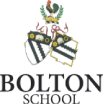
Laura Johnstone, a former Girls’ Division pupil at Bolton School, delivered the latest virtual World of Work session to Year 10 girls, in which she spoke about her career working in Medical Communications.
Casting her mind back to when she was the same age as her audience, Laura recalled how she chose what to study through a mix of picking things she was good at and liked and what universities seemed to be looking for. She had thought she might pursue a career in Medicine, possibly as a doctor or vet and opted for A levels in Chemistry, Biology and German. On reflection, she said her A levels were the toughest part of her education, including her PhD! Having not made it into any of the four medical schools she chose, she opted to study Biomedical Sciences at Newcastle University. During her time there, particularly after a summer scholarship allowed her to spend a protracted spell in a microbiology lab, she decided that this was what she really enjoyed doing. It encouraged her to go on to study for a four year PhD in Medicine at Lancaster University, funded by the NHS. Spending more time in the lab, she told how she focused her studies on bacteria and its links to rheumatoid arthritis.
Upon completion of her studies and in need of a job, Laura explained how she came across medical communications, which, with her PhD, she said she seemed well suited for. She explained about her job as a Scientific Director for the Healthcare Consultancy Group, specialising in medcomms within the pharmaceutical industry. She described the field as being a group of agencies that advise and support the pharmaceutical industry in their communications to healthcare professionals like doctors, nurses and pharmacists – educating them in the benefits and risks of medicines and products. The work, she said, can involve writing clinical trial papers, going to congresses or symposia and providing strategic support; it also encompasses how to roll out new drugs and ensuring they get to the patients who need them. She extolled the benefits of working in medcomms, telling how it had allowed her considerable flexibility and how she now works part-time, having recently had a child. Laura said her work also entails occasional travel to European congresses. She concluded by advising the GCSE students that you will end up doing a job for a long time so, if you can, do something that you enjoy doing.
The session ended with Laura answering questions including what made your A levels seem so much more difficult than a PhD and did you receive financial and emotional support during your study years?
















.jpg&command_2=resize&height_2=85)


.jpg&command_2=resize&height_2=85)



